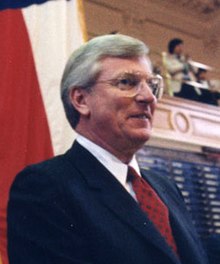Mark White
| Mark Wells White, Jr., | |
|---|---|

Governor Mark White addressing a joint session of the Texas Legislature on January 14, 1987, six days before leaving office.
|
|
| 43rd Governor of Texas | |
|
In office January 18, 1983 – January 20, 1987 |
|
| Lieutenant | William P. Hobby, Jr. |
| Preceded by | Bill Clements |
| Succeeded by | Bill Clements |
| 46th Attorney General of Texas | |
|
In office January 19, 1979 – January 18, 1983 |
|
| Governor | Bill Clements |
| Preceded by | John Hill |
| Succeeded by | Jim Mattox |
| 74th Secretary of State of Texas | |
|
In office January 19, 1973 – October 27, 1977 |
|
| Governor | Dolph Briscoe |
| Preceded by | V. Larry Teaver, Jr. |
| Succeeded by | George Strake, Jr. |
| Personal details | |
| Born |
Mark Wells White March 17, 1940 Longview, Texas, U.S. |
| Political party | Democratic |
| Spouse(s) | Linda Gale Thompson |
| Children | 3 (two sons, one daughter) |
| Residence | Houston, Texas, U.S. |
| Alma mater | Baylor University |
| Profession | Lawyer and politician |
| Military service | |
| Allegiance |
|
| Service/branch |
|
| Unit | 36th Infantry Division |
| Battles/wars | Vietnam War |
Mark Wells White, Jr., (born March 17, 1940) is an American lawyer, who served as the 43rd Governor of Texas from January 18, 1983 to January 20, 1987.
White was born in Henderson, in Rusk County, Texas to parents Mark Wells White, Sr., and Sarah Elizabeth White. White attended Baylor University in Waco, Texas, and was a member of the Tryon Coterie Club, now Phi Delta Theta (Texas Lambda Chapter) at Baylor. He graduated from Baylor Law School in 1965. After spending time practicing law in a private practice in Houston (Harris County), White served as the state's assistant attorney general. In 1973, White was appointed as Texas secretary of state under Governor Dolph Briscoe and also served in the 36th Infantry Division of the Texas National Guard.
White served as secretary of state until 1977, when he resigned to run for state attorney general, where he served until 1983. In the 1978 general election, White defeated the Republican choice, James A. Baker, III, a Houston lawyer, businessman, and power broker affiliated with the Bushes of Houston. White polled 1,249,846 votes and (55.13 percent) to Baker's 999,431 votes and (44.08 percent). As the state's chief enforcement officer, he co-chaired the Federal-State Enforcement Coordinating Committee and was a member of the Governor's Organized Crime Prevention Council. On the national level, he was elected Chairman of the Southern Conference of Attorneys General in May 1981.
White declined to seek a second term as state attorney general, but chose to seek the governorship in 1982 against fellow Democrat Bob Armstrong, who was the outgoing state Land Commissioner, who vacated the General Land Office following twelve years, and then the incumbent Bill Clements, Texas' first Republican governor since Reconstruction. In November 1982, he defeated Clements over concerns about the governor's poor economic numbers and lack of support from minority groups. White received 1,697,870 votes (53.2 percent) to Clements' 1,465,537 (45.9 percent) in a year where Texas Democrats swept all the statewide offices being led by U.S. Senator Lloyd Bentsen (who won a third six-year term to the Senate) and the legendary Lieutenant Governor of Texas William P. Hobby Jr. (Hobby was first elected lieutenant governor in 1972) both of whom carried the Democratic Party's statewide banner which also included the elections of Jim Mattox as state attorney general, Bob Bullock, who won his third term as Texas Comptroller of Public Accounts-having been elected in 1974, Ann Richards as state treasurer, Garry Mauro as Commissioner of the General Land Office, and Jim Hightower as Texas Commissioner of Agriculture while Democrats easily maintained their majorities in both houses of the Texas Legislature. As the state's forty-third chief executive from January 18, 1983 to January 20, 1987, White worked to "preserve and enhance... resources so that Texas would not fall back, but go forward as a state of the future." His main concerns were the economy and education. By focusing on Texas' resources, White was able to work on many problems facing the state in the early 1980s. The Texas economy during the early and mid-1980s was volatile. The price of oil declined and pushed Texas into a recession. This led Governor White to "lay the groundwork for a more diversified economy--one less reliant upon the...swings of a single industry."
...
Wikipedia
